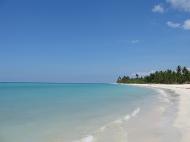Mon, Jan 18th 2010, 11:58
Haiti History is a long tale of brutality and isolation since the arrival of Christopher Columbus in 1492. Haiti is the second oldest republic in the western hemisphere and the oldest black republic on earth.
Haiti History is first recorded with the arrival of the Spanish in 1492. Here they discovered an island inhabited by Taino Amerindians who called their island Ayiti. The Spanish renamed it La Isla Espanola (Spanish Island) which later became Hispanola.
The native Taino soon succumbed to foreign diseases carried by the new settlers and were all but wiped out within a few decades of the Spanish arrival. The Spaniards proceeded to colonise the island and the surviving Taino escaped to the mountains.
For strength in numbers, the settlers concentrated in the area which is now the capital city of the Dominican Republic, Santa Domingo. This left the rest of the island uninhabitaed, making it an ideal place for pirates to establish bases. Tortuga, a settlement started by French buccaneers in 1625, became an infamous pirate hangout.
In 1697 the Spanish ceded the western third of the island to France. In time colonists began to outnumber pirates and the farming of tobacco, cotton and cacao began. Huge numbers of slaves were shipped in to the colony, known as Saint-Domingue, and soon it was one of the wealthiest in the Caribbean - "the pearl of the Antilles". By 1780, 40% of sugar and 60% of coffee consumed in Europe came from Saint-Domingue.
This agricultural activity required vast numbers of slaves, in fact the slave population outnumbered their masters 15:1. There was a strong African culture on the island and to this day voodoo is still practiced by many.
Slave owners were brutal in maintaining control and France turned a blind eye to the various horrific punishment techniques such as boiling problem slaves in hot syrup. Many slaves escaped and took to the mountains to join the few surviving Taino in their freedom.
These rebels soon became a strong military force and by 1791, slaves staged a revolt following a call to arms by a voodoo priest. An extended period of brutality and killing settled on the island as rebels attacked the colonisers and slave owners retaliated with even worse acts of brutality against their slaves. This only served to strengthen the resolve of slaves to win their freedom.
On 1 January 1804 they won their cause and declared independence. The land reclaimed the Taino name, Haiti (meaning Land of Mountains). Haiti became the second-oldest republic after the United States of America.
Haiti has enjoyed independence ever since but it has been a difficult one for her people plagued by a succession of brutal rulers, civil war and foreign interference. Commercial isolation has ensured that Haiti is one of the poorest countries on earth with very little infrastructure. While neighbouring Dominican Republic is lush and forested, Haiti is barren. The population of Haiti is the densest in the Americas and without electricity people have cut down their trees for fuel.
80% of the population of Haiti lives below the poverty line, vulnerable to the hurricanes and natural disasters which strike the island. While the people of Haiti have their freedom, they have never been free of the tragedies of Haiti History.

Haiti History reviews
Login to comment